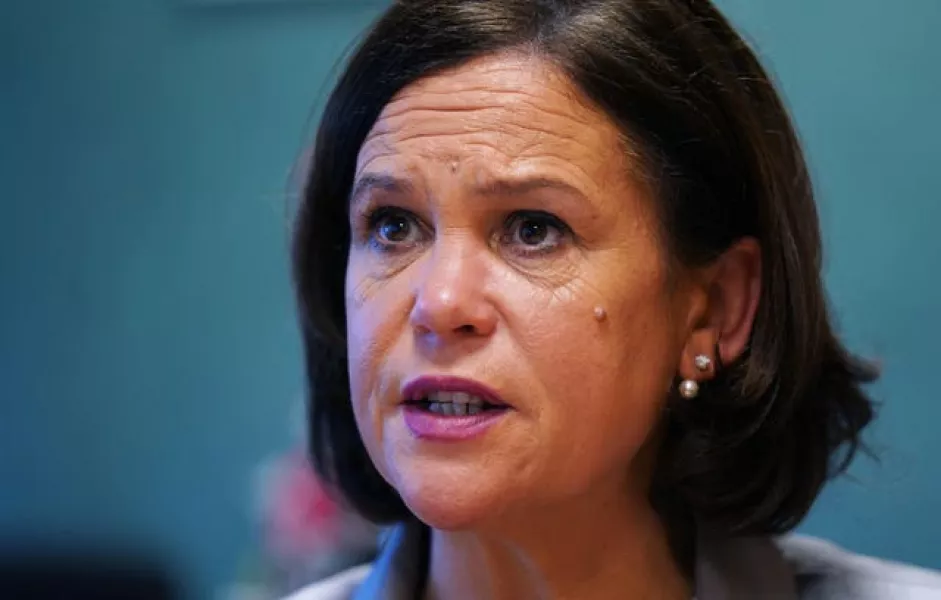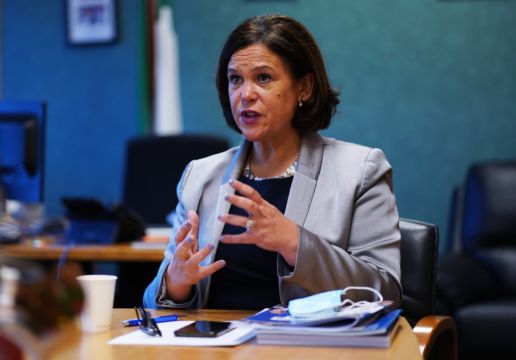The Good Friday Agreement has provided the “toolbox” to achieve a united Ireland without risking a return to violence, Mary Lou McDonald has said.
Throughout much of 2021, unrest has resurfaced in Northern Ireland, amid loyalist opposition to the Protocol which saw riots across the North, buses hijacked and burned out, and threats of violence against southern politicians, including Leo Varadkar.
However, the Sinn Féin leader has dismissed suggestions that a bid for Irish unity would spark an even stronger reaction from loyalism.

She said: “You’ve asked me about violence, and you’re saying, can we navigate this space or is it naïve to imagine that we can do all of this in a peaceful manner?
“I’m saying to you, no, it’s not. Absolutely not.
“In fact, we’re so lucky as a generation that we have the toolbox to actually do precisely that.
“We have the guide, we have the map, we have the compass in the Good Friday Agreement.
“That’s why it’s so important that people like me, and people across Irish Republicanism and nationalism, but also in unionism and loyalism, are very clear that whatever our views or whatever our desired outcome, that the only way forward is democratic, peaceful and orderly.
“I am firm in that view. I’m saying that as the leader of Sinn Féin and I would like to hear others – our unionist colleagues, our loyalist colleagues – reiterating that and echoing that so that everybody is in a shared space in respect of that issue.”
In March this year, four days of riots broke out in Waterside, Derry, before the disturbances spread to south Belfast – in particular at the Peace Wall pressure point of Lanark Way – as well as Carrickfergus and Newtownabbey.
Loyalist protests broke down into full-scale riots, with iron bars, masonry and petrol bombs thrown at the police, cars hijacked and burnt out, which in turn sparked counter-demonstrations by nationalists, and police resorted to the use of riot vans and water cannons.

Speaking to the PA News Agency, Ms McDonald said: “Whatever people’s views on the protocol, on the constitutional question, on reunification, or retaining the union, whatever your perspective, that’s fine.
“We have the democratic architecture and process for all of those views to be heard.
“There is no reason, there is no excuse, there is no basis for violent actions by anyone.”
She added: “I have to say this also, the unrest that we saw around the protocol was advanced by a small group of people.
“It is not representative of the views of people across society.
“There is no appetite in my view, at all, in any section of society, bar a tiny minority, for violence or unrest or burning buses.”
She said elements of the Good Friday Agreement, such as human rights provisions and the rights to citizenship and identity, should be retained in a united Ireland.
Ms McDonald has called for a citizen’s assembly on a border poll to take place as soon as possible.
If the current Government will not provide one, it will be the first order of business should Sinn Féin triumph at the next election.
While she insists that “everything will be on the table” in the debate, any olive branch to unionism will not extend as far as having God Save the Queen as an anthem in a new Ireland.
“That doesn’t work for me, I have to tell you,” she laughs.
“Like I say, somebody who wants to make that argument can make it. But you’re not going to hear it from me. No, I don’t think that’s a good idea at all.”
However, she believes July 12th, a date when unionists mark King William of Orange’s victory at the Battle of the Boyne in 1690, could be “a nice summer public holiday”.
“I think you could move beyond the kind of rancor sometimes associated, many times associated, with that time of the year” she said.
“It was very problematic in the north, as we know, and we could turn it into something positive.
“I think that could be a really interesting conversation.”
A devolved Government in Belfast is another possibility that could arise on foot of a successful border poll, though Ms McDonald worries it could replicate the mistakes of partition.
“That’s a conversation that needs to be had,” she says.
“I think in discussing that we need to keep an eye on robust democratic representation, you know, popular buy-in, people feeling empowered and represented.
“We also need to keep an eye on efficiency of delivery. We’re a small island. This is not Australia. This is not a vast territory. This is a small island.
“The objective has to be how we will get a real return, economically and socially, from reunification.
“In my view, it’s by not simply bolting the North on to the South, but creating island-wide capacity.
“Because partition has meant that duplication, and we lose in that. It’s costly, it’s inefficient, and it holds us back. So, we would want to be very careful about not making that mistake again.”

Many have suggested that unionist politicians should be given a quota in a United Ireland parliament, and perhaps even in Government, something McDonald says should be given “careful consideration”.
She said: “Our unionist population would have a considerable representation in an all-Ireland parliament, actually much stronger than their current strength at Westminster, for example.
“So it’s certainly not something that I am advancing. But I’d like to hear the argument for it, I’d like to hear how that works out and what exactly that means.”
The biggest issue, Ms McDonald believes, will not be around symbols, but public services such as healthcare.
“When I am out and about over many years, talking to people, and discussing the prospect of change and unity, the first thing that’s raised with me is healthcare.
“Not flags, not anthems, not any of that. The first issue that people raised with me as a matter of practical concern is, will I have to pay to see my GP?
“Will my family actually get the care that they need?
“So, I’m not denying that those issues that you’ve cited are issues of concern.
“But they’re not, in my view, where we start the conversation. In my view, we start the conversation with what kind of standard of living, what kind of standard of services do we expect, and can we provide?
“Then, on the other issues, as far as I’m concerned the Irish flag is the tricolour. You know, the anthem is Amhran na Bhfiann.
“I see no merit in rejoining the Commonwealth, those are my views.”

For any border poll to take place, it must be called by the Northern Ireland Secretary of State.
McDonald has reiterated calls for the UK government to set out the conditions necessary for that to happen.
“I want them to set out their stall publicly, and then we can analyse that, and we can debate it,” she said.
“But there has to be some indication now, officially, of how the British State or a British Prime Minister would regard that we have arrived just a moment for the referendum to be called.
“It’s been extremely unhelpful that they wouldn’t set that out.”







